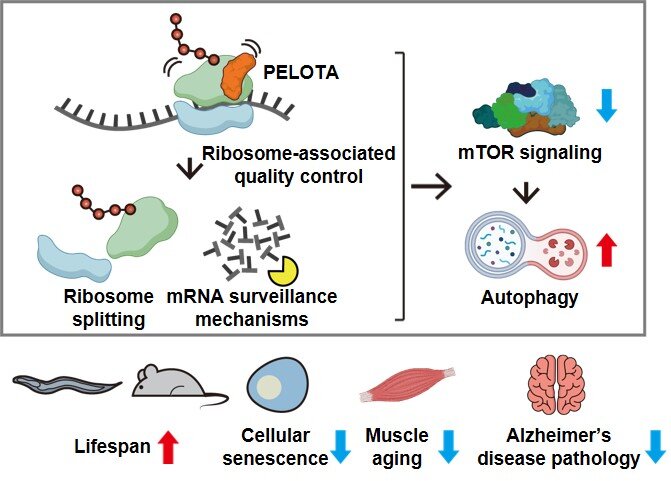Until we get a PELOTA activator, we have rapamycin:

Using C. elegans (a nematode widely used in aging research due to its short lifespan), the researchers first discovered that the ribosome-associated quality control factor PELOTA is essential for longevity. In particular, when PELOTA was overexpressed in normal nematodes, their lifespan was extended, suggesting that ribosome-associated quality control mechanisms involved in removing abnormal mRNA are necessary for promoting longevity.
The study also revealed that the ribosome-associated quality control system simultaneously regulates both the mTOR signaling pathway—which senses nutrient status or growth signals to control cell growth, protein synthesis, and autophagy, and plays a key role in aging and energy metabolism—and the autophagy pathway, the cellular cleanup and recycling system through which cells break down and reuse unnecessary or damaged components.
When PELOTA was deficient, the mTOR pathway became abnormally activated, and autophagy was suppressed—accelerating aging. Conversely, activation of PELOTA inhibited mTOR and induced autophagy, thereby maintaining cellular homeostasis and extending lifespan.
Notably, this mechanism was found to be conserved in both mice and humans. The study also showed that the loss of PELOTA could contribute to muscle aging and Alzheimer’s disease, suggesting its relevance to age-related disorders.
Paywalled paper:
Pelota-mediated ribosome-associated quality control counteracts aging and age-associated pathologies across species
Significance
Our study identifies ribosome-associated quality control (RQC), regulated by Pelota, as a conserved longevity mechanism. Pelota extends lifespan in Caenorhabditis elegans, prevents senescence in humans, delays muscle aging in mice, and protects against Alzheimer’s pathology. By suppressing mechanistic target of rapamycin (mTOR) hyperactivation, Pelota maintains autophagy-mediated proteostasis, highlighting RQC’s therapeutic potential in aging.
Abstract
Ribosome-associated quality control (RQC) is a pivotal biological process that governs the fidelity of messenger RNA (mRNA) homeostasis and protein synthesis. Defects in RQC are implicated in cellular dysfunction and proteotoxicity, but their impact on aging remains elusive. Here, we show that Pelota, the ribosome rescue factor, promotes longevity and protects against age-related pathological phenotypes in multiple metazoan species. By performing a targeted genetic screen, we find that Pelota is indispensable for longevity in the nematode Caenorhabditis elegans. We show that Pelota mitigates premature senescence in cultured human cells, muscle aging in mice, and neuropathology in cellular and organoid models of Alzheimer’s disease. Mechanistically, we demonstrate that Pelota maintains autophagy-mediated proteostasis, by preventing the hyperactivation of mechanistic target of rapamycin signaling. Overall, our work highlights the conserved functional significance of RQC, regulated by Pelota, in extending lifespan and protecting diverse species against age-associated disease phenotypes.